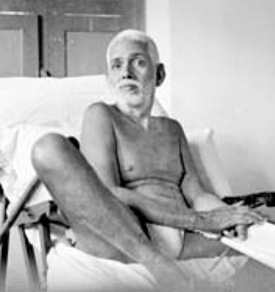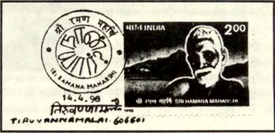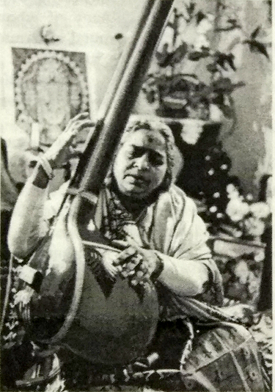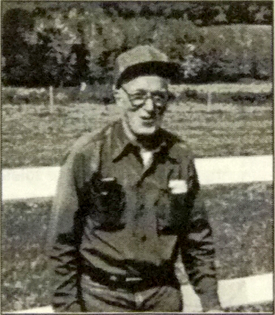Concentrate on the Original Purpose
After spending about twelve years in personal attendance on Bhagavan, I began to feel an urge to devote myself entirely to sadhana, spending my time all alone. However, I could not easily reconcile myself to the idea of giving up my personal service to Bhagavan. I had been debating the matter for some days when the answer came in a strange way. As I entered the hall one day I heard Bhagavan explaining to others who were there that real service to him did not mean attending to his physical needs but following the essence of his teaching: that is concentrating on realizing the Self. Needless to say, that automatically cleared my doubts.
I therefore gave up my Ashram duties, but I then found it hard to decide how in fact I should spend the entire day in search of Realization. I referred the matter to Bhagavan and he advised me to make Self-enquiry my final aim, but to practice Self-enquiry, meditation, japa and recitation of scripture turn by turn, changing over from one to another as and when I found the one I was doing irksome or difficult. In course of time, he said, the sadhana would become stabilised in Self-enquiry or pure Consciousness or Realization.
From my personal experience, as well as from that of others within my knowledge, I can say that before recommending any path to an aspirant Bhagavan would first find out from him what aspect, or form, or path he was naturally drawn to and then recommend him to follow it. He would sometimes endorse the traditional stages of sadhana, advancing from worship (puja) to incantation (japa), then to meditation (dhyana), and finally to Self-enquiry (vichara). However, he also used to say that continuous and rigorous practice of any one of these methods was adequate in itself to lead to Realization. Thus, for instance, when one adopts the method of worship, say of the Shakti, one should, by constant practice and concentration, be able to see the Shakti everywhere and always and in everything and thus give up identification with the ego. Similarly with japa. By constant and continuous repetition of a mantra one gets merged in it and loses all sense of separate individuality. In dhyana again, in constant meditation, with bhavana or deep feeling, one attains the state of Bhavanatheeta, which is only another name for pure Consciousness. Thus, any method, if taken earnestly and practiced unremittingly, will result in elimination of the "I" and lead to the goal of Realization.
Once some awkward problems concerning Ashram management cropped up. Without being directly concerned, I was worried about them, as I felt that failure to solve them satisfactorily would impair the good name of the Ashram. One day. two or three devotees went to Bhagavan and put the problems before him. I happened to enter the hall while they were talking about them, and he immediately turned to me and asked me why I had come in at this time and why I was interesting myself in such matters. I did not grasp the meaning of his question, so Bhagavan explained that a person should occupy himself only with that purpose with which he had originally come to the Ashram and asked me what my original purpose had been. I replied: "To receive Bhagavan's Grace." So he said: "Then occupy yourself with that only."
He further continued by asking me whether I had any interest in matters concerning the Ashram management when I first came here. On my replying that I had not, he added: "Then concentrate on the original purpose of your coming here."
The Journey of My Heart
Passages from the Diary of a Pilgrim to Sri Ramanasramam
January 4, 1983
Once again Ramaswami Pillai and I enjoyed an openhearted talk while children, one after another, came to his door to receive a few pennies from his hands.
The children called him "Tatha" or grandfather, and he said, "The first time I was called 'tatha' I was not shocked, but surprised! I looked in the mirror and saw I had no teeth and white hair. Since coming to Bhagavan I have no feeling of aging. I am the same. And on the contrary, as one meditates the mental process is reversed. Mentally, one becomes younger and stronger. [This no doubt was borne out in his case, as he lived a hundred years! - editor]
January 5, 1983
Paul and I began our Evening Recitation at 6 P.M., and while reciting "Sri Arunachala Pancaratnam," Kunju Swami and Ganesan walked into the room. The chanting flowed of its own accord, and I felt merged in the light of Arunachala Siva!
After a period of silence, Kunju Swami proceeded to immerse us with his gracious and consoling words, all aimed at encouraging us. He complimented us on our recitation and said it should be taped.
"Though we moved closely with Bhagavan," he continued, "and he always acted normal, just as one of us, Bhagavan invariably had a far-off look. I believe that look was for such as you who live at a distance. You are special recipients of His Grace. Those who live near take it for granted; those far-off remain thinking of Bhagavan. We (he and Ganesan) are the frogs; you are the bees!" He said this in reference to verse 6 of "Sri Arunachala Patikam:"
Lord of my life! I have always been at Thy Feet like a frog which clings to the stem of the lotus. Make me instead a honey bee which from the blossom of the heart sucks the sweet honey of pure Consciousness. Then shall I have deliverance.
"Bhagavan not only taught us vichara marga," Kunju Swami resumed, "He taught us how to live. He taught us not to drink until the end of the meal; to have fruit last of all; not to mix cold water with a drink or with hot water, but to let it to cool naturally. We observed all his actions and learned all these things. In so many ways, Bhagavan taught us how one can live happily anywhere in the world.
"Also, Bhagavan stressed that all devotees should know how to cook simple food, and he emphasized the importance of limiting the quantity of intake. 'Even too much sattvic food becomes tamasic,' Bhagavan would say. He wanted devotees to be self-reliant and not depend upon others for their basic needs. In Palakothu, all the sadhus cooked for themselves and Bhagavan would take a personal interest in their diets. But our purpose should not be to think of food, but to think and talk of Bhagavan."
"Bhagavan himself was a great cook! Not only was he highly skilled in preparing food, he also was a spiritual cook of souls, He baked our egos and served them to Arunachala! His "Song of the Poppadum" gives us some understanding in this matter.
I expressed my desire to cook a meal for Swamiji and he declined the offer so graciously that I almost didn't mind his not accepting it. He said that by watching me serve he could tell I was a good cook, and the very thought of my offer gave him the same satisfaction as eating whatever I would have prepared for him.
(continued in the Jul/Aug issue)
The Grace that brooks no barriers
The author of this article, Sri C.R. Rajamani, presented the following talk at the April 25th Aradhana program at Arunachala Ashrama in New York City. He and his wife are visiting their son, Dr. C.R. Ramakrishna, of Stony Brook, NY.
I HAVE been a devotee of Bhagavan Sri Ramana Maharishi for over 55 years. I was in my early twenties when I first had His darshan. The event is still fresh in my memory not because I was at that age so mature, which I was not, but because of a very remarkable incident I saw on that occasion.
I went to the Ashrama in the early forties when the Second World War was at its peak and our own independence movement was also at its maximum intensity. I am not certain about the date or the month of my visit; it may have been December or January. I remember the season was quite cool. The summit of the Holy Arunachala was shrouded in dense mist and clouds. The morning air was crisp and pleasant.
It was in the original small hall, that is remembered by the early devotees with justifiable fondness, that I first saw Sri Bhagavan seated on a raised platform. A cast-iron charcoal brazier was radiating a comfortable warmth, and a pleasing aroma of the incense thrown into it at regular intervals was pervading the entire hall. About thirty people, comprised of men, women and a few young boys were seated on the floor facing Sri Bhagavan. None spoke or even whispered between themselves. What struck me was, no one showed even an inclination to talk. Some were meditating with closed eyes. The silence was definitely not an imposed one.
Sri Bhagavan, his body luminous like burnished gold, was sparsely clad in his usual kaupinam and a small towel across his chest. He appeared to be occasionally dozing off and had to steady his head often. He frequently stretched his palms over the fire and massaged his long fingers. In spite of his apparent dozing, his eyes did not look drowsy. On the contrary, they were extraordinarily bright and alert. He was not looking at anybody in particular, nor were his eyes roaming about the hall in idle curiosity. Although my first impression was not a very uplifting one, I felt I was in the presence of an extremely affable person with a lot of natural grace, at perfect ease and without any pretension whatsoever. I was, however, aware of an effortless peace in the hall.
I saw a white-skinned boy, a foreigner, of about ten years sitting a couple of feet to my left. Next to him was a white man, presumably his father. Further to my left, beyond the central aisle, was a white woman, whom I thought was the boy's mother. I then saw Sri Bhagavan's eyes alight on the boy for a brief minute. I thought it was just a casual look. The boy was all the time looking at Sri Bhagavan with a sort of fixation, as if on the verge of asking a question. But, no! He broke into tears. A cascade of tears came gushing out of his eyes. They were not tears of pain, for his face was radiant with joy. In temples, I have seen adults shedding tears in ecstasy, and had myself experienced that type of joyous outpouring on hearing a beautiful hymn or a moving melody, but I had never seen a ten-year-old boy from a far-off land exhibiting this type of beautiful expression in an extremely quiet and serene atmosphere. I could see that Sri Bhagavan's glance, though only resting on him for a brief moment, had opened in the boy's heart a veritable reservoir of pure joy.
I did not feel a remorse for my lack of receptivity that I ought to have felt. But I felt most fortunate to see a boy not even half my age showing such an alert sensitivity. The flat feeling I had experienced earlier was washed away by the joyous tears of another; I really felt blessed in an indirect way. Direct or indirect, blessing is blessing. Whenever I recall this incident, it creates a feeling of being very near to something truly Divine. Of course, I have had my own share of Sri Bhagavan's grace in my later years. I have also had some ever-fresh visions which I dare not devalue as creations of a fevered imagination for they have strengthened my faith in Sri Bhagavan. Some of them occurred decades after Sri Bhagavan's Mahanirvana. They have been firm confirmations of his continued Presence and reassurances of his immortal words, "They say I am going! Where can I go? I am always here!"
Now, returning to that first day at the Ashrama, I learned that the boy had come along with his parents, both of them Theosophists. The Theosophical Society's world convention is usually held at their international headquarters at Adyar, Madras in December-January. Some of the people from foreign countries choose to visit Sri Ramanasramam at that time. The boy's parents arranged a trip to Tiruvannamalai, but he stoutly refused to go with them, as he was not in tune with conditions in India which can never be adequate when compared with the posh amenities of his native Australia. However, he changed his mind at the last moment and did make the trip. Within an hour of his face-to-face meeting with Sri Bhagavan, his mental barriers were reduced to nothingness. He shed tears for quite some time and later said to his mother, "I am so happy. I don't want to leave his presence. I want to be always with him!" His mother was most upset. She pleaded with Sri Bhagavan, "Swami, please release my son! He is our only child. We will be miserable without him." Sri Bhagavan smiled at her and said, "Release him? I am not keeping him tied up. He is a mature soul. A mere spark has ignited his spiritual fire." So, that casual look was a spark of tremendous power. Turning to the boy, He said, "Go with your parents. I will always be with you." He spoke in Tamiḷ throughout, but the boy understood him fully. He bowed to Sri Bhagavan and reluctantly left with his parents, immensely rich with the newly-found spiritual treasure.
Quintessence of Wisdom Reprinted
Published by V.S.Ramanan, President, Sri Ramanasramam, pp.50
Quintessence of Wisdom was first published in 1955 and has been out of print for many years. It is essentially an English translation of Sri Bhagavan's Tamiḷ version of "Upadesa Saram."
The translator, Sri M. Anantanarayanan, the former Chief justice of the Madras High Court, has created a rather loose translation, a 'transcreation' as he calls it. As an example, verse seven is usually translated as the following: "Better than spells of meditation/ Is one continuous current/ Steady as a stream/ Or downward flow of oil" (from the Sanskrit). Compare this to: "As the unbroken stream of fragrant oil/ As the river flows ceaselessly into the breast of the sea/ Not fugitive thought/ Not fitful preoccupation/ This is the excellence of meditation." The author is aware of the possible pitfalls of this non-literal approach, but notes that there are other literal translations available. In any case, English speakers will find this translation very fluid and inspiring.
The one or two paragraph commentaries on each verse are often insightful and are written in the author's own words with many original turns of phrase. Again taking verse seven as an example, we have, "Meditation is rarely understood. In its native, characteristic form, it is not thought, nor any kind of thought process. It is the silence and peace of the mind-stuff, in which the Real is effortlessly mirrored." The author's deep understanding and devotion to Sri Bhagavan comes through clearly in his commentary. Some readers will also find the introduction interesting. It is of a philosophical bent, invoking everyone from Kant to T.S. Eliot to William Blake. This is apparently not an effort of the author to make an impression, but rather a function of who he takes his audience to be – the scholar familiar with Western works. In fact his unclouded understanding of the essential point and his deep reverence for Sri Maharshi are apparent. The patient reader will find the introduction worthwhile, and even the impatient reader would do well to read section three, a summary of Sri Bhagavan's life written in very original prose.
Sri Ramana Maharshi's 48th Aradhana
In Arunachala Ashrama, New York
On Saturday, April 25, 1998 Sri Ramana Maharshi's 48th Mahanirvana was observed at the New York Arunachala Ashrama, Bhagavan Sri Ramana Maharshi Center.
The Ashrama shrine was completely full with devotees who all sang enthusiastically Bhagavan's "Akshara Mana Malai," "Arunachala Pancharatnam" and "Upadesha Saram." Also, the devotees were led in the singing of spirited bhajans sung in resounding unison and with full-hearted devotion.
Two of the devotees present had on several occasions visited Sri Ramanasramam in the 1940s. Sri C. R. Rajamani of Madras graciously described his first visit to Sri Ramanasramam. He had written out his talk which we have included in this issue of the MAHARSHI (see page 2). Also, Sri Comal Subramanian, a devotee of Janaki Mata from his youth, described how this revered saint from Tanjur requested him to go to the Maharshi. He then very warmly described some of the incidents he had observed during his several visits there. He was especially graphic in describing the Maharshi relationship with animals and all the wonderful scenes he witnessed.
Phil Marden, a resident of Brooklyn, NY, returned from Sri Ramanasramam a few days earlier. He brought with him a gift from Sri V. S. Ramanan, President of Sri Ramanasramam, which he was requested to present to Arunachala Ashrama on this day. It was the new Sri Ramana Maharshi postal stamp and the "First Day Cover" released by the Department of Post in India on April 14.
The day's program concluded with arati and the serving of prasad (meals) to all the devotees, many of whom lingered on to begin another round of hymns and songs in praise of Ramana Arunachala.
"Arunachala, Thou dost root out the ego of those who meditate on Thee in the Heart, O Arunachala!" [2]
In the Nova Scotia Arunachala Ashrama
A few of Bhagavan's dedicated devotees gathered in Sri Arunachala Ramana Mandiram on Friday, April 24. Sri Chakra Puja was performed, followed by hymns and readings suffused with devotion and dedication to our Master, Sri Arunachala Ramana.
In Days of Great Peace
THE book under the above title was first published in 1952 and tells the story of a Westerner (Mouni Sadhu) who came to Sri Ramana Maharshi in 1950, just months before the Maharshi's Mahanirvana. In spite of the Sage's failing health, the author was enabled to absorb the teachings so intensely that he was quickly taken into the experience of oneness. He graphically, without technical language, delineates his step by step entrance into spiritual awareness while residing in the holy atmosphere of Sri Ramana Maharshi and Arunachala.
Unfortunately, the book has long been out of print. Melvin Powers of California obtained the publishing rights from George Allen & Unwin, Ltd. decades ago, but has only printed it once and will not print it again unless he is convinced that there will be some sales. If our readership, especially bookstores and distributors, would contact him by telephone, or even better, by letter, and express their interest in its reprinting, Mr.Powers said he would respond favorably. We ask that you please write to him so this inspired book may once again be available to devotees and seekers.
12015 Sherman Road,
N. Hollywood, CA 91605
Tel: 818-765-8579
Obituaries
Savithri Devi Krishnan
We are sad to hear the news of the passing of Savithri Devi Krishnan of Bangalore on April 11, 1998. She was 85-years-old.
She spent eleven years in Nova Scotia, Canada, mostly in the 1970s, and was a frequent guest and resident of Arunachala Ashrama in Bridgetown.
As a young girl Savithri once sang at the Madras Theosophical Society for Rabindranath Tagore, who was immediately inspired to ask her to return with him to his then small Bengal school known as Santiniketan. A tall imposing figure, with long white hair and beard, Tagore appeared at first a forbidding personality to her and she refused the honor. In a canny way he managed to persuade her otherwise and her new life under the affectionate guidance of this poet-saint transformed her forever. Her musical talents blossomed and inspiration and devotion to God became the indelible foundation of her life.
Savithri Krishnan later sang many of Tagore's songs, some of which were especially composed for her, to large audiences and in recording studios. In recognition of her inspired gift, Tagore once wrote in her autograph book, "If my songs find a dwelling in your voice, I wonder who becomes the donor, you or I."
In Nova Scotia, she worked at the Halifax Free School, a special walk-in facility for wayward adolescents. There she would teach crafts, sing songs, but most of all, offer these wayward children the genuine love of a mother's heart. To her students, and the growing East Indian community in Nova Scotia who adored her, she was addressed only as Mataji (Mother).
Our fond and affectionate memories of her will live on, as well as the inspiration and insights she brought into our lives.







Mr. Edwin Connell
From the first day of our arrival at the Nova Scotia Ashrama twenty-six years ago, Mr. Connell, the immediate neighbor east of the Ashrama, took us under his wing, taught us the country ways and demonstrated a warmth and wholehearted friendship hard to come by in today's society.
He took a keen interest in watching over the Ashrama when no one was there, maintaining the Ashrama lawns, inspecting the buildings and plowing our garden with his horses. Every year, up to the last year of his life, he would bring to the Ashrama buckets of homegrown corn and cucumbers to be served to our guests at the annual Advent at Arunachala program at the end of the summer.
Although he liked to maintain a rough outer surface, his heart was soft like butter and his insight into life was as clear as spring water. He derived the greatest joys from the simplest gifts of nature and lived an uncomplicated and contented life. By his life and words we have learned many lessons, and our lives will be much less full by his physical absence.
Letters and Comments
Faith
I sometimes have faith in the existence of God or an Ultimate Reality and sometimes I feel I have no faith at all. This inconsistency in my attitude seems to undermine my aspiration and spiritual practices. Many times I feel I am in a quagmire with no way out...
For most aspirants faith in the existence of God will not be firm or continuous until the actual experience of His presence is felt. Then it is no longer a faith, but an actual perception of Truth that had earlier eluded the seeker. Until this perception of Truth is experienced, faith in Its existence is necessary. We must take as truth what the illumined sages like Ramana Maharshi or Sri Ramakrishna have told us. They wish only that we also be illumined and free from sorrow and doubt. We must believe them, follow their teachings and live by their example. That is the path open to us, and it is open to us only by God's grace.







Work and Spiritual Life
I was wondering if you could give me some advice. I am in a dilemma with my work situation and have been for some time. I am a tradesman in the metal industry and have worked in it on and off for many years. I desperately want to get out of the industry but for the life of me do not know what I want to do. An opportunity may be opening up for me with B.P., which is not in this trade. The conditions are great and so is the pay. The only problem is I find that the company is not spiritually based. In fact all of the companies I have worked for are like this. I have been wandering around for years trying to find out what I want to do and have come to dead ends.
I pray to Bhagavan about it. I feel a sense of homecoming now, a desire to reside in the Self. Every time I try to fill the void inside me with anything but God I only find misery. What I am trying to say is I feel torn between whether I should continue to work in the world and serve God, or commit my life to spiritual training in a more traditional sense (i.e., join an ashrama or equivalent) and serve God.
We have found that the most important factor in spiritual life is spiritual practice, the practice of prayer, meditation, Self-enquiry and Self-surrender. Anything may happen to us outwardly, but when an intense spiritual practice is maintained, we remain strong within and are not affected. The storms may rage on the surface of the ocean but we lie deep below, on the floor of existence, undisturbed, at peace and free. So, ultimately, it matters little if you take this new job or not. What really matters is that you dive deep within yourself and realize your true nature. That is what Bhagavan tells us again and again.
If you make this your ideal in life, Bhagavan will guide you in every way, he will place you in the best situation needed for your spiritual progress. That has been our experience and I am sure it will be yours too.






